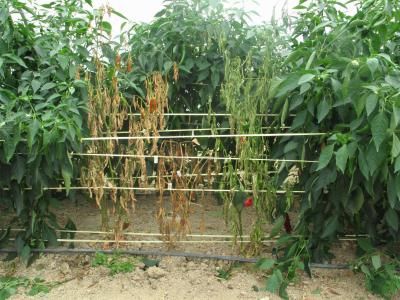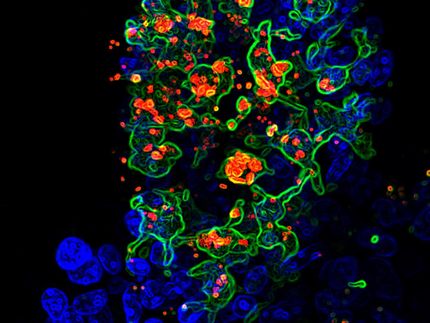Bio-disinfection with semi-composted manure to control a pepper crop disease
Advertisement
Researchers at the Basque Institute for Agricultural Research and Development, Neiker-Tecnalia, have confirmed that the use of semi-composted manure in combination with the plastic sealing of the soil is an effective control for Phytophthora capsici, a fungus responsible for a disease that seriously affects greenhouse-grown peppers. The research developed in the PhD thesis by the biologist Mireia Núñez-Zofío, evaluates soil bio-disinfectants that not only combat the proliferation of pathogens, but are also environmentally friendly and economically viable.

This images shows pepper cultivation in greenhouses with symptoms of disease.
Neiker-Tecnalia
For the control of edaphic crop pathogens (those present in the soil), chemical products have traditionally been used that in some cases have adversely affected human health, the soil and the environment. Due to these problems, there is a need to seek out alternatives to chemical soil disinfectants. One of these alternatives techniques is based on biological processes. Neiker-Tecnalia's research has confirmed that bio-disinfection is an effective control for root and collar rot in greenhouse-grown peppers. This is a disease caused by the soil-borne phytopathogenic fungus Phytophthora capsici; in this setting, chemical disinfection has achieved inefficient results. Bio-disinfection is a low-cost, easy-to-apply technique that can be used in integrated pest management and organic agriculture. It also enables agricultural production to be achieved at competitive prices, while providing an outlet for certain livestock and agro-industrial waste that generate environmental problems (manure, poultry droppings, molasses).
The study was carried out in two very different agroclimatic areas: the Basque Country and the region of Murcia. In the Basque case, adding semi-composted manure to the soil and its subsequent sealing with transparent plastic for six weeks emerged as an effective practice for disease control, despite the fact that the soil temperature reached during the treatment was not high enough to thermally inactivate the Phytophthora capsici oospores. Oospores are resistant spores that survive for long periods of time in the soil and are responsible for the onset of the disease.
The Neiker-Tecnalia researchers have been able to confirm that the degradation of the manure added to the soil raises the concentration of ammonia under the plastic cover and increases the biomass and diversity of the microorganisms in the soil. Following the continued application of bio-disinfection over three years, an improvement in the physical, chemical and biological properties of the soil was likewise observed. This led to an increase in the soil's buffering capacity that prevented the disease´s development.
The trials that took place in the region of Murcia in summer time confirmed the importance of the high soil temperature to render the P. capsici oospores inactive. However, in autumn, the less favourable season as far as heat is concerned, it was established that organic soil amendments perform a crucial role in reducing pathogen survival. Organic amendments, like semi-composted manure, increased their effectiveness when the treatment was repeated on the same soil for several years, not only for the control of Phytophthora capsici, but also for the phytoparasitic nematode Meloidogyne incognita.























































